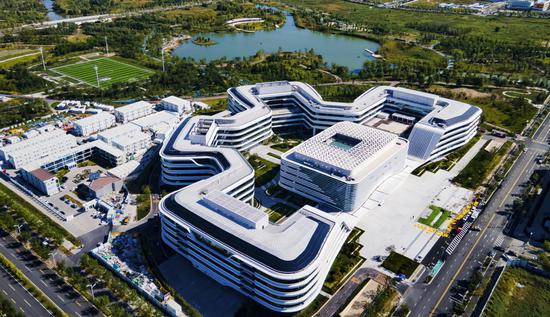Business giants moving to Xiong'an New Area

An aerial view of the headquarters of China Satellite Network Group Co in Xiong'an New Area, Hebei province. (CHINA DAILY)
More and more business giants are settling in Xiong'an New Area, North China's Hebei province, as part of a plan to relieve the national capital Beijing from non-capital functions.
China Satellite Network Group Co, an enterprise engaged in the design, construction and operation of satellite internet services, has opened its new headquarters in the area's internet industrial park.
Making up of a group of low-rise buildings and shaping like a flower when viewed from above, the office complex was completed last month and involved the moving of its headquarters and four subordinate companies on Oct 14.
The company was the first centrally administered State-owned enterprise to settle down in the area. The SOE will facilitate the gathering of resources in fields such as industry-related companies, technology and talent in Xiong'an and thus promote the development of satellite internet applications and the aerospace information industry.
As Xiong'an has charted ambitious development plans for the satellite internet sector, many upstream and downstream enterprises and innovation platforms have rushed to the area.
A national laboratory of aerospace flight technology has been established in the area, according to local media Hebei Daily. Other companies in the sector, including a spatiotemporal information group, have also registered and settled there.
Sinochem Holdings, a chemical conglomerate, and China Huaneng Group Co, a major power company, have completed their main headquarters buildings in Xiong'an.
Projects of other companies and institutes, including Sinomine Resource Group Co and Beijing Jiaotong University, also report progress on the construction of their buildings.
SOEs have set up nearly 300 various types of institutions in Xiong'an, according to the local government.
Located about 100 kilometers southwest of downtown Beijing, Xiong'an was set up in 2017 as part of a strategy to promote the coordinated development of the Beijing-Tianjin-Hebei region.
One of its main roles is to serve as the receiver of non-capital functions previously shouldered by Beijing but not essential to Beijing's role as the capital city, such as universities, company headquarters and research institutions.
